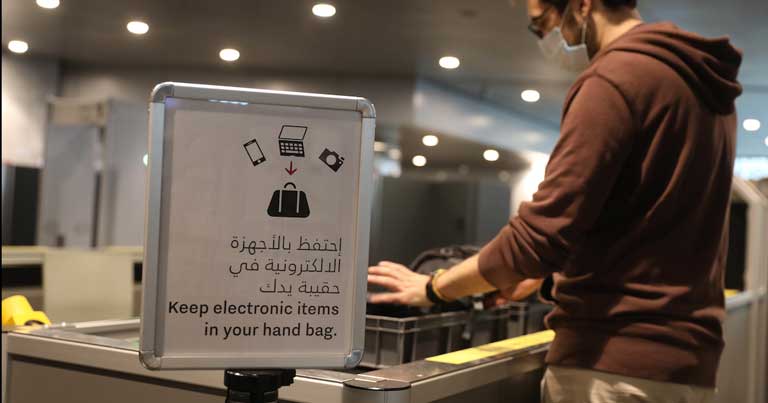
Hamad International Airport (HIA), a member of the FTE Innovation & Startup Hub, has adopted new technology to enhance its security screening process, while elevating COVID-19 measures by minimising contact at security checkpoints.
The security screening technology is an advanced algorithm that enables security personnel to easily detect explosive materials held in complex items and structures.
This also allows transfer passengers to keep electronic devices such as laptops, tablets, digital cameras and other devices, in their hand luggage while going through security checkpoints, improving levels of customer service and hygiene.
The new C2 technology will be initially implemented across all transfer screening checkpoints, upon the gradual reopening of transfer gates. It will significantly enhance airport security while speeding up the inspection process and boosting throughput.
The ECAC C2 Detection standard can identify threat materials in congested bags, including electronic devices that previously had to be segregated from bags.
Once the bag is placed on the X-ray for screening, it can be collected without any further stops for re-screening or physical inspections. The system is also a significant counter COVID-19 measure, that reduces possible cross-contamination among passenger carry-on bags. The implementation of the technology will elevate the airport’s hygiene standards, by limiting human contact at the security checkpoints, making the process safer and faster for both staff and passengers.
Saeed Yousef Al-Sulaiti, Vice President – Security at Hamad International Airport said: “The security process at HIA is continuously improving through the introduction of cutting-edge technologies. Our goal is to make the travel journey safer, given the current COVID-19 pandemic. During these challenging times, our priority remains to protect passengers while preserving security. Through the implementation of C2 technology, we can accomplish a more efficient protocol that addresses all passenger concerns. Our passenger-centric strategy helps us continue our investments towards that front while developing solutions that are in the best interest of our people.”
Applying this latest technology will boost HIA’s passenger processing capacity while reducing queuing times at security points.
HIA has also announced that it is looking into the prospect of implementing body scanners, to provide better security outcomes while slowly easing all body search procedures. This potential technology will prove to be helpful in the COVID-19 climate as it helps reduce contact during body searches. The airport is also exploring the introduction of a combination of anti-bacterial trays at checkpoints and automated UV emitting modules that will automatically disinfect the trays passengers touch to further safeguard the health and safety of all HIA passengers.
HIA has recorded previous milestones in its transfer security screening in 2019, witnessing shorter queuing times at security points which can accommodate up to 6,000 passengers during peak hours. The airport also introduced additional transfer halls that allow 95% of transfer passengers to queue for under five minutes.
Early biometrics investment is paying off
Recently, the airport also announced the successful completion of the second phase of its Smart Airport Program, offering a fast, secure and contactless airport experience by implementing biometric identification technology. The technology allows passengers to combine their flight, passport, and facial biometric information in a ‘single travel token’ at the self-check-in kiosk. This digital identity record ultimately makes the passenger’s face their pass at key airport touchpoints, such as self-service bag-drop, pre-immigration, e-Gate and the self-boarding gate. According to the airport this early investment in the biometric identification technology has proved to be an extremely efficient tool in HIA’s battle against COVID-19, allowing passengers to move through key touchpoints with minimal physical contact.
The circumstances surrounding COVID-19 are continuously evolving. Our friends at APEX have a dedicated COVID-19 page, which they’ll be updating regularly to help keep you up-to-date on how the novel coronavirus is impacting the aviation industry. Visit the page for the very latest news >>





